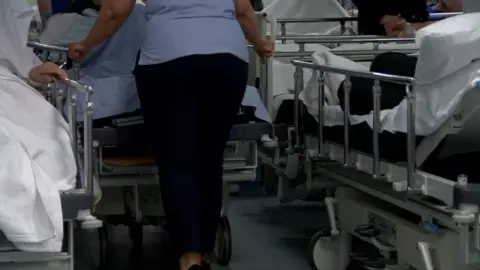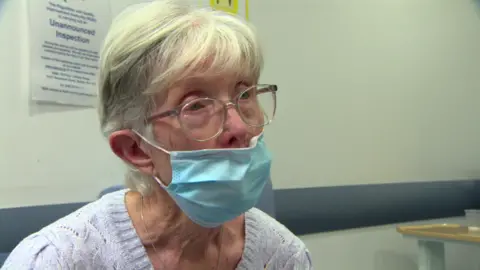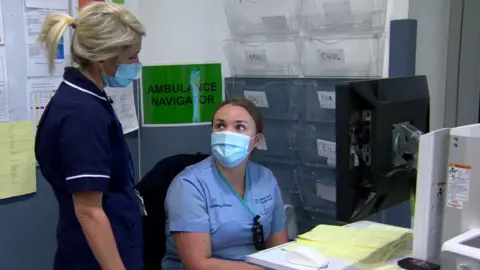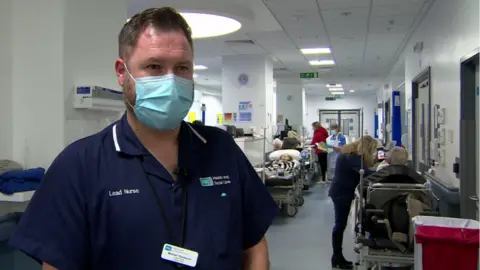A&E: Nurse says Belfast A&E overcrowded and undignified
Providing dignified care in overcrowded emergency departments (ED) is a daily challenge, a nurse at Belfast's Royal Victoria Hospital has said.
Claire Wilmont said staff struggle to find space to "treat the sickest of the sick including resuscitating patients".
The number of incident report forms which record patient safety incidents are twice what they were five years ago in the Belfast Trust's EDs.
One senior consultant likened scenes in the ED to "battlefield" medicine.
It comes amid concerns about a rise in cases of bacterial and viral infections, notably strep A, which has placed additional pressures on health services.
On Wednesday the Royal Belfast Hospital for Sick Children postponed all routine procedures, with the Belfast Trust saying it was facing "significant pressures".
In 2018, there were 622 incident report forms filled in the trust's EDs.
There have been more than 1,200 completed so far this year.
Forms are filled in after an unintended or unexpected incident which could have, or did, lead to harm for a patient receiving care.
Belfast Trust said the rise was partly to do with staff being encouraged to complete forms.
Staff said the increase was more to do with a higher rate of incidents involving patient care.
BBC News NI was granted exclusive access to the area on Tuesday as part of a BBC-wide spotlight on emergency care across the United Kingdom.
Throughout the day, staff in Belfast manoeuvred trolleys carrying patients through very tight areas as they attempted to find available space.
In one area, known as acute care, trolleys were lined up head to toe with staff having to squeeze between them in order to check patients and to deliver food.
For staff, work was relentless.
For patients, it was an anxious time as they waited - some for more than 24 hours - for a bed.


'It's so distressing, it's so busy'
Sitting in a chair at the door was 73-year-old Mary Prentice whose husband had been brought in after a fall in his nursing home.
Mary said he had been in an ambulance for almost two hours and, when she spoke to BBC News NI, they had been sitting in the area for about four hours.
Her husband is 75 and has Alzheimer's.
"He's very distressed, he doesn't know where he is," she said.

"It's so distressing, it's so busy.
"I don't know what they can do to sort this out.
"If I had my way, I would take him out now. Only I know he has to get his stitches, it's not suitable for him.
"My daughter and I, we had to go and change his clothes, try and get him a sandwich. He hadn't his breakfast when he fell, he had nothing in him.
"I feel so sorry for him, but I don't know what the answer is.
"They [politicians] have to get back to Stormont. Nothing is going to change until they do.
"They have to get back and do the job they were paid to do."


Lead nurse Claire Wilmont said it was normal for very ill patients to be squeezed into areas often built for three patients, but instead hold more than double that number.
"This is an every day challenge for my staff who are faced with these scenes.
"Retaining dignity and delivering compassionate care is a challenge we are faced with every day."
Claire has been a nurse for almost 20 years. Clearly she's held in high regard by her staff who are constantly asking her advice.
At one stage, a nurse asked where she could find a trolley for a seriously-ill patient being brought in by ambulance. Claire told her, if possible, to move a patient into a chair to free up the trolley.
'Overcrowded and undignified'
In the red resuscitation area, where the most critically ill are nursed, there are five patients in a four-bed space.
Again, little space for nurses to work, and in some bays family members had to stand.
Claire moves swiftly from one area to another.
"There is a large volume of acutely unwell, very frail, elderly people that we are trying to provide dignified care for, but it is all completely overcrowded in an undignified space for staff to try and treat anybody," she said.
"A standard shift is 12 hours and management are coping with some staff on a work-to-rule."
The work is demanding; three breaks of approximately 30 minutes in one shift is typical.
A nurse tells me she has needed to use a bathroom for several hours but hasn't found the time.

Michael Thompson is lead nurse in charge of patient flow between the ED and wards.
As he arrives on his shift and checks the charts, he knows the team is in for a long night.
"It's like a huge game of Jenga trying to slot people into places without everything falling over," he said.
"At the minute, we have 106 patients fit enough to be discharged home but either families cannot take them or there is no care package available.
"If we could have those 106 beds back, that would mean we could start moving the 60 patients up into wards who have to be admitted."
During 24 hours on Tuesday, 329 people attended the emergency department at the Royal Victoria Hospital and 75 people required admission.
Three miles away in the Mater Hospital, a further 134 people were seen at its ED on the same day.
